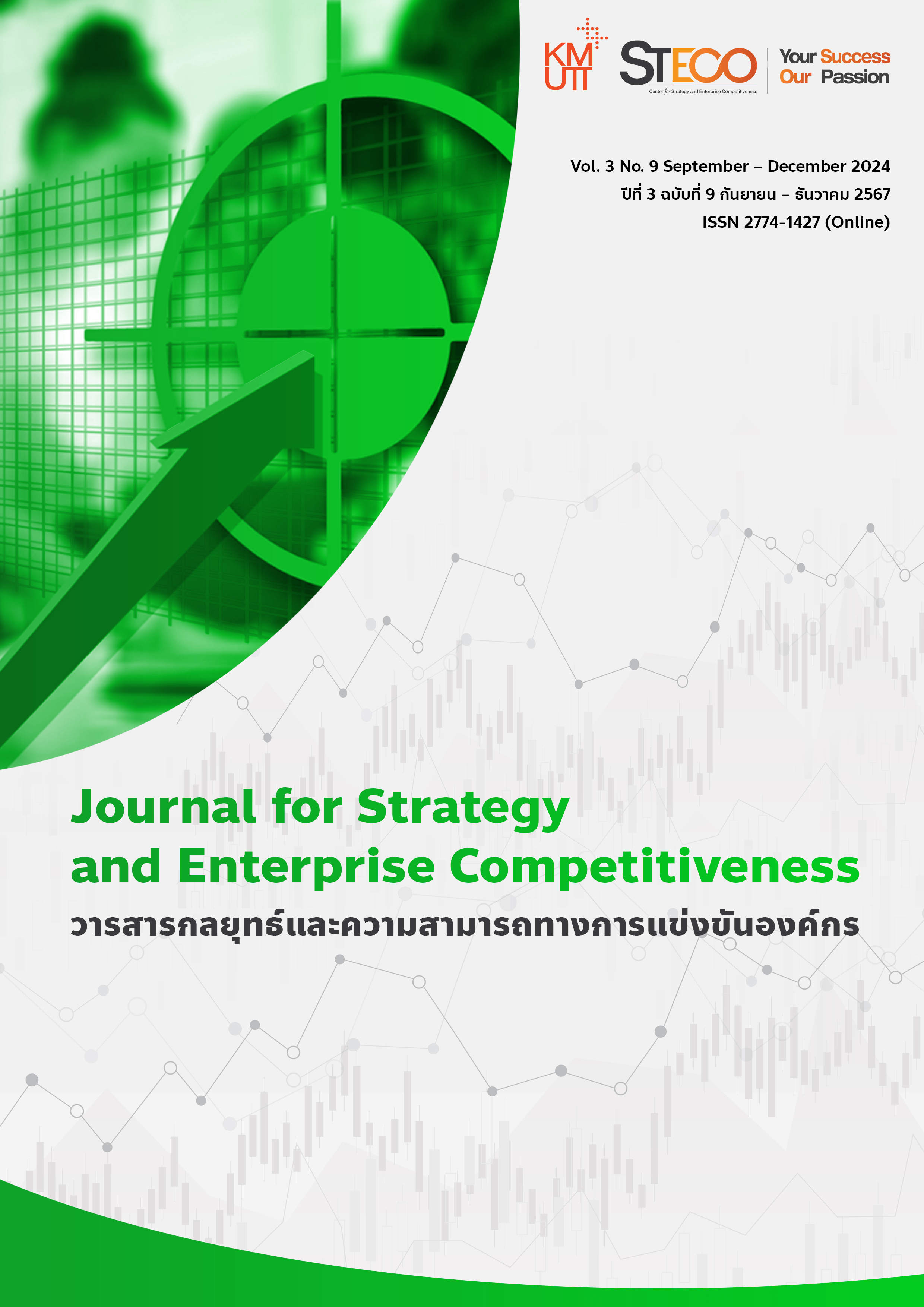An Analysis of Upstream Processes in the Durian Supply Chain: Production Sources, Modes of Transportation and Transport Cost to Local Marketing
Keywords:
upstream processes, supply chain, Durian, local marketsAbstract
This study focuses on investigating the upstream processes in the durian supply chain in Chanthaburi Province, focusing on plantation size, production volume, sales models, and transportation to local central markets. The sample group consisted of 393 durian farmers, randomly selected as durian farmers in Chanthaburi Province, who were the group that sold their products in the central market. The research found that most farmers had a planting area between 31-50 rai, accounting for 22.90 percent, with an average production volume of 75.84 tons annually. The most popular sales model was selling to exporters, accounting for 43.82 percent, followed by selling in the local central market, accounting for 34.35 percent. In terms of transportation, it was found that single-cab pickup trucks were the most commonly used vehicles for transporting durian, with an average load capacity of 2,230 kilograms per trip. The average transportation cost for durian was 0.60 baht per kilogram. The data from this research can be used to plan production, marketing, and manage the transportation of durians for maximum efficiency and improve the local fruit supply chain system.
References
Aphiprachayasakul, K. (2017). Transportation cost management in agricultural supply chains. Thai Logistics and Supply Chain Journal, 12(1), 45-59.
Aphiprachayasakul, K. (2019). Agricultural logistics management: The use of technology in cold chain systems. Bangkok: Kaset Thai Publishing.
Aphiprachayasakul, K. (2019). Supply chain theory in agricultural products: Resource and information management at every stage of the chain. Bangkok: Kaset Thai Publishing.
Ballou, R. H. (2004). Business logistics/supply chain management: Planning, organizing, and controlling the supply chain (5th Edition). Pearson Prentice Hall.
Boehlje, M. (1999). Structural changes in the agricultural industries: How do we measure, analyze, and understand them?. American Journal of Agricultural Economics, 81(5), 1028–1041.
Bowersox, D.J., D.J. Closs, M.B. Cooper and J.C. Bowersox. 2013. Supply Chain Logistics Management. 4th ed. McGraw-Hill. Singapore.
Chanin, S. (2016). The impact of transportation costs on the competitiveness of agricultural products in global markets. Journal of Agricultural Economics, 45(3), 67-85.
Chatchawan, S., Krisana, K., & Kongkiat, S. (2020). Factors affecting durian production volume in eastern Thailand. Agricultural Research Journal, 24(3), 75-89.
Christopher, M. (2021). Logistics and supply chain management (5th ed.). Pearson.
Department of Agricultural Extension. (2021). Agricultural transport and logistics development for local economic improvement. Department of Agricultural Extension, Ministry of Agriculture and Cooperatives.
Department of Agricultural Extension. (2023). Opening 31 agricultural tourism gardens in Chanthaburi Province in 2023 to serve tourists from April to June. Retrieved from https://www.doae.go.th
Jaffee, S., Siegel, P., & Andrews, C. (2010). Agribusiness logistics and supply chain management: Optimizing production and market linkages for rural development. World Bank.
Kasikorn Research Center. (2017). Thai durian export in the global market. https://www.kasikornresearch.com
Lazzarini, S. G., Chaddad, F. R., & Cook, M. L. (2001). Integrating supply chain and network analyses: The study of netchains. Journal on Chain and Network Science, 1(1), 7–22. https://doi.org/10.3920/JCNS2001.x007
Somporn, P., & Wittaya, C. (2019). Study of durian marketing channels in northeastern Thailand. Journal of International Trade, 18(2), 112-126.
Somchai, P., Suwan, C., & Pramote, T. (2017). Analysis of fruit transportation costs in rural areas of Thailand. Journal of Agricultural Economics, 14(1), 43-57.
Wang, M., & Wood, L. C. (2021). Transportation capacity shortage influence on logistics performance: Evidence from the Australian logistics service providers’ driver shortage.
Waters, D. (2003). Logistics: An introduction to supply chain management. Palgrave Macmillan.
Xu, S. and Hao, Y. (2020) Xu, Y., et al. (2020). Redefining supply chains: Technology-driven approaches. Supply Chain Management Review, 26(3), 45-52.
Yamane, T. (1973). Statistics: An introductory statistic, (Second Edition). New York: Harper & Row.

Downloads
Published
How to Cite
Issue
Section
License
Copyright (c) 2024 Journal for Strategy and Enterprise Competitiveness

This work is licensed under a Creative Commons Attribution-NonCommercial-NoDerivatives 4.0 International License.
The opinions appearing in the content of articles of Journal for strategy and enterprise competitiveness. It is the opinion and responsibility of the article author. It is not the opinion and responsibility of the Center for strategy and enterprise competitiveness, King Mongkut's University of Technology Thonburi
Articles, information, content and images, etc., in the Journal for strategy and enterprise competitiveness. It is the exclusive copyright of the Center for strategy and enterprise competitiveness, King Mongkut's University of Technology Thonburi. If an individual or entity wants to distribute all or part of the content or for any action must obtain written permission from the Center for Strategy and enterprise Competitiveness, King Mongkut's University of Technology Thonburi.


